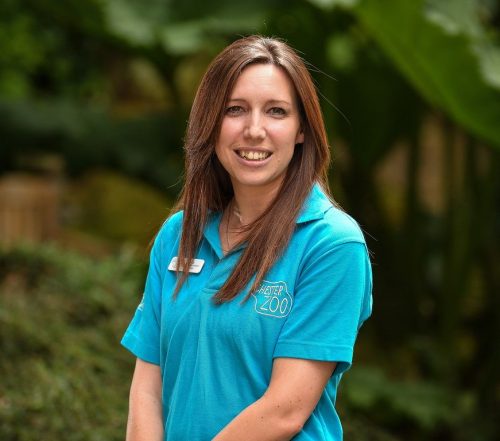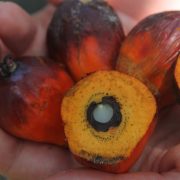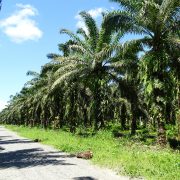We spoke to Cat Barton, Field Conservation Manager, about the importance of sustainable palm oil.
I’ve been a member of the Field Programmes team since 2008. My role is varied, but the majority of my work is focussed around managing partnerships with field projects in Borneo and Sumatra and engaging with stakeholders in the palm oil supply chain. I am Chester Zoo’s ‘palm oil champion’ but the work on this issue is a massive team effort and not a one-person job!

The issue of unsustainable palm oil is a conservation threat which has been growing over the past few decades. We strongly believe that boycotting palm oil is not the answer and the issue is not that simple.
Read Chester Zoo’s position on palm oil here.
The palm oil industry is a huge part of the economy in Indonesia and Malaysia. Palm oil itself isn’t bad – in fact, it’s the most productive of all the vegetable oils and the most efficient. It’s the unsustainable production of palm oil and the way it can be grown which causes the problem. We also strongly feel that boycotting palm oil removes you from being part of the solution. Palm oil is consumed by countries worldwide with India, Indonesia and China consuming significantly more than the UK. If we boycott palm oil and avoid the problem, conventional or unsustainable palm oil will still be developed and sold to these other much larger markets who are not calling for sustainability. If we instead work to change the whole industry we will have a much greater impact.
This is why we firmly believe that a credible sustainable system is the answer and we fully support those striving towards this goal. We do however realise that the road to sustainability is a long one and change can’t happen overnight – as much as we’d like it to!
The journey which has led to the launch of the Palm Oil Challenge has been a long one. The conservation issue of unsustainable palm oil is a complicated one and remained unfamiliar to the general public and even companies that have been using the product for many years. Although I’ve been working with partners and other organisations for a number of years, it was only when the labelling legislation came in in 2014 that we were really able to push the awareness.
Working in partnership has been key in my work on palm oil. Engaging with various stakeholders locally, nationally and globally to find solutions to this conservation problem is one way we have been able to influence many sectors in the supply chain. Between us, our staff work with national and international zoos, field partners, food suppliers, schools, local companies and environmental NGO’s to influence and create a demand for sustainable palm oil.
PSSSTT
In terms of the zoo, our audit teams have done a fantastic job in working with our suppliers to inform them of our policy and working to eliminate unsustainable palm oil from our supply chains. This is an ongoing process as well – many companies are using the end of 2015 deadline as a goal for 100% sustainable palm oil use.
We have been working with partners in Malaysian Borneo since 2007and this partnership is really important to us. Our partners, HUTAN, are members of the Roundtable on Sustainable Palm Oil (RSPO) and are working in the field on this issue. They are involved directly in orangutan research and work together with the local government and other organisations to find solutions to the threats posed by palm oil production.
 Photo credit: Nick Tignonsini
Photo credit: Nick Tignonsini
Our stance on palm oil mirrors that of our partners in the field – sustainable palm oil is the responsible choice. Our work is emulating that of our partners, but working at the other end of the palm oil supply chain – the consumer end. We want to make a difference by increasing the demand amongst consumers, retailers and manufacturers for sustainable palm oil, to make the job easier at the growing end of the chain. If the demand exists there’s more hope for sustainable production.
The main challenge with palm oil is that it’s a complicated and often misunderstood subject. For us, the challenge is making sustainable palm oil the norm. This is difficult in itself as currently, although RSPO is the most recognised system, traceability and transparency is still an issue in the scheme. Progress has been made on the road to sustainability but there is still a way to go!
You can’t help but be inspired working where I do with dedicated staff but it’s not just those based in Chester – our partners all over the world inspire us on a daily basis. They’re the ones that are based in the field working at the frontline to protect species. I’m lucky enough to work with some of the most committed conservationists in the world. With palm oil, it’s one of the few issues occurring overseas that we can have a direct impact on back here in the UK. That’s why I feel so strongly about helping to find solutions to this problem.
The Palm Oil Challenge brings together all our work on palm oil over the last few years. The Palm Oil Challenge has a number of components, one being the shopping list. The idea for this came from our staff and visitors who are constantly asking “which products can I buy and not feel guilty about?” Finding products which contain palm oil is easy – it’s labelled. But finding out if it’s sustainable or not is the difficult part.
Some companies label their products with sustainable palm oil which is easy, but for others you need to dig into their policies to find out where they currently stand.
Many companies have made commitments to source from RSPO supply chains, but we wanted to create a list of those who have already reached their commitments. As I’m sure you can see, it’s not an easy job as there are hundreds of brands out there – which is why we’re asking for the public’s help to compile this list.
We want the public and companies to get behind it and join in with the challenge – we really hope that through awareness and motivating companies to achieve their sustainability goals, the campaign will help to increase demand for sustainable palm oil. I strongly believe that collaboration is key to solving this conservation problem; individuals alone cannot solve the issue.
Sumatran rhinos have already been classified as extinct in the wild in Malaysia – we don’t want this to happen to any other species. We need to act now to ensure that wildlife is protected which means ensuring all our industry practices don’t compromise wildlife. Sumatran orangutans are critically endangered with less than 7000 remaining – we need to ensure they are protected and that human practices don’t continue to impact on their survival.
The Sustainable Palm Oil Challenge has been a massive team effort and we’re really excited to see people get involved with the challenge and assist us with our campaign. Launching the challenge is just the first step. For this to work, we need to get the public adding to our shopping list. I’m really keen to see how the shopping list changes over time as more and more companies reach their goals to source 100% certified sustainable palm oil. Many are getting there but are still covering some of the commitment with certificates. This is great, as this in itself is helping to create a demand for sustainable palm oil. But what we really want to see is every company on the 100% physical certified sustainable palm oil (CSPO) list and more moving towards deforestation free palm oil!
I hope that through the work we’ve been doing, we will have assisted in some way towards protecting the amazing and diverse wildlife that is affected by palm oil production. It’s a small part of the chain, but to me, it’s an important part and I really believe we can make that difference
Take part in our Palm Oil Challenge
SUSTAINABLE PALM OIL CITY
If you’re interested in getting your town or city to become a Sustainable Palm Oil City, then find out more about how to get started…
NOW is the time to ACT FOR WILDLIFE. Conservation is CRITICAL; species are under threat. TOGETHER we can make a BIG difference. Take action TODAY and join us in PREVENTING EXTINCTION.



